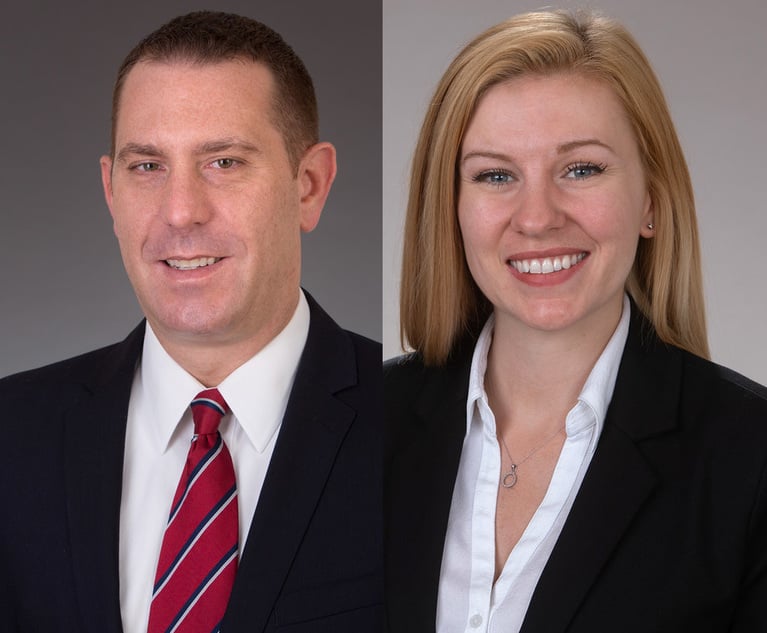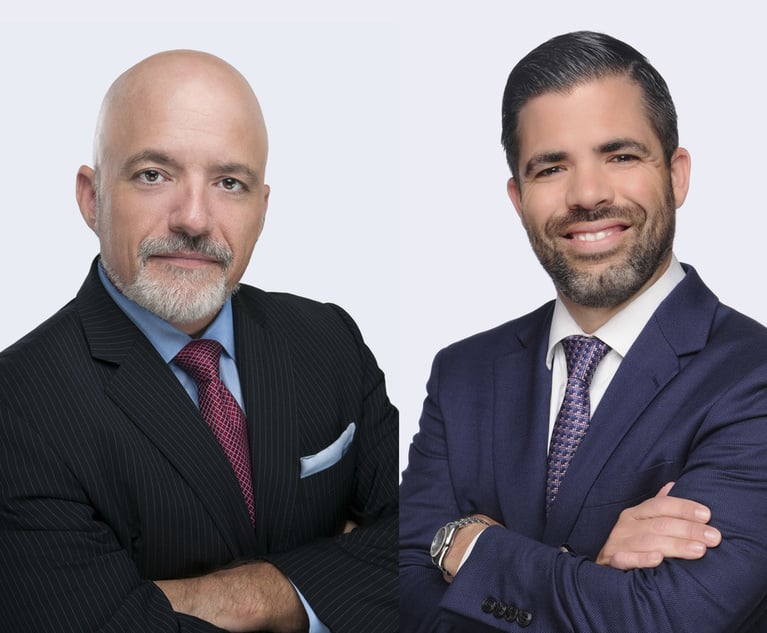How Small and Midsize Law Firms Survived the Big Law Salary Hikes
In the summer of 2016, Cravath, Swaine & Moore rocked the legal world by raising starting salaries for associates from $160,000 to $180,000. Shortly…
January 11, 2018 at 10:45 AM
5 minute read

In the summer of 2016, Cravath, Swaine & Moore rocked the legal world by raising starting salaries for associates from $160,000 to $180,000. Shortly after, 101 additional firms announced they would follow suit, raising the stakes in the war for legal talent. Small and midsize law firms with fewer financial resources, however, have had to get more creative when attracting skilled job seekers.
According to legal blog, Above The Law, Miami firms Weil Gotshal, Locke Lord, Baker & McKenzie, Boies Schiller, Hughes Hubbard, McDermott Will, Jones Day and Holland & Knight followed suit to match the new salary scale. Even smaller firms began to do more with compensation—Washington, D.C.-based boutique firm Wilkinson Walsh + Eskovitz recently beat Cravath's bonus scale for all associates, providing bonuses at one and a half times the market rate.
However, when the well of excess financial resources is shallower than most, what are small and midsize firms to do? One of the biggest advantages small and midsize firms have over large firms is partnership track offerings. While it certainly depends on the experience level of the attorney, more small firms are offering partnership track upfront in place of a higher starting salary during job negotiations. Another benefit for employees of small firms? Opportunities for more responsibilities on a higher volume of projects.
A recent Robert Half Legal survey revealed 62 percent of lawyers at small and midsize firms said finding skilled legal professionals is somewhat or very challenging, while 31 percent of survey respondents expressed concern about losing legal personnel to other job opportunities in the next six months. In the same survey, 28 percent of lawyers said that, aside from compensation or bonus, flexible work arrangements provide the greatest incentive for legal professionals to remain with an employer. Challenging work or variety of assignments ranked second, receiving 26 percent of the survey response, followed by professional development opportunities, at 20 percent.
While law firms are focused on growing revenue in an increasingly cutthroat environment, it's clear that many job candidates are looking beyond compensation for an employer that can provide competitive benefits, interesting projects and increased responsibilities. According to another survey, helping legal professionals diminish job-related stress and improve work-life balance may be a legal firm's most effective retention strategy. Forty-two percent of attorneys interviewed by Robert Half Legal cited reduced stress levels as the one aspect of their job they would change, an 11-point increase since the survey was last conducted in 2008.
In the effort to create a positive work environment that makes employees want to stay, smaller businesses often have an edge over big firms in the ability to be more creative with policies that address work-life balance, including flexible work arrangements such as:
- Flextime—Flextime refers to any arrangement that gives employees options for structuring their work day or work week. In the most extreme (and rarest) form, employees decide for themselves not only when they work but also for how long. More typically, though, employees operating under flexible work arrangements are expected to be on the job during certain core hours of the workday. They're given the opportunity to choose (within certain parameters) their own start and stop times—as long as they work the required number of hours each day.
- Compressed workweek—Under this arrangement, employees work the normal number of hours but complete those hours in fewer than five days. The most common variation of the compressed workweek is the so-called 4/10, in which employees work four 10-hour days instead of five eight-hour days. Employees often appreciate this arrangement as it provides an extra day at home, thus improving work-life balance—a topic explored further in the Robert Half report, The Secrets of the Happiest Companies and Employees.
- Telecommuting—Telecommuting refers to flexible work arrangements in which employees—on a regular, predetermined basis—spend all or a portion of the week working from home or from another noncompany site.
In addition to alternative work arrangements, fostering a professional environment and culture where employees feel comfortable and appreciated can be extremely attractive to job candidates. For instance, nearly 60 percent of lawyers interviewed by Robert Half Legal reportedly prefer a casual work setting. In today's competitive job market, employers are using creative strategies to recruit and retain legal professionals, including adopting a less formal work environment. A more relaxed workplace can reduce stress, foster creativity and ultimately enhance productivity and job satisfaction.
Small and large firms may be looking at completely different pools of applicants, but the current hiring market favors candidates and requires firms of any size to get creative with recruiting and retention. Compensation alone can't sustain an employee's interest and loyalty, though strong company culture and values, professional development opportunities and flexibility can help.
Debra Frank Montero is regional vice president of Robert Half Legal, the premier provider of experienced project and full-time professionals for law firms and corporate legal departments in South Florida.
This content has been archived. It is available through our partners, LexisNexis® and Bloomberg Law.
To view this content, please continue to their sites.
Not a Lexis Subscriber?
Subscribe Now
Not a Bloomberg Law Subscriber?
Subscribe Now
NOT FOR REPRINT
© 2025 ALM Global, LLC, All Rights Reserved. Request academic re-use from www.copyright.com. All other uses, submit a request to [email protected]. For more information visit Asset & Logo Licensing.
You Might Like
View All



Don’t Forget the Owner’s Manual: A Guide to Proving Liability Through Manufacturers’ Warnings and Instructions
5 minute readTrending Stories
- 1Judge Sides with Retail Display Company in Patent Dispute Against Campbell Soup, Grocery Stores
- 2Is It Time for Large UK Law Firms to Begin Taking Private Equity Investment?
- 3Federal Judge Pauses Trump Funding Freeze as Democratic AGs Launch Defensive Measure
- 4Class Action Litigator Tapped to Lead Shook, Hardy & Bacon's Houston Office
- 5Arizona Supreme Court Presses Pause on KPMG's Bid to Deliver Legal Services
Who Got The Work
J. Brugh Lower of Gibbons has entered an appearance for industrial equipment supplier Devco Corporation in a pending trademark infringement lawsuit. The suit, accusing the defendant of selling knock-off Graco products, was filed Dec. 18 in New Jersey District Court by Rivkin Radler on behalf of Graco Inc. and Graco Minnesota. The case, assigned to U.S. District Judge Zahid N. Quraishi, is 3:24-cv-11294, Graco Inc. et al v. Devco Corporation.
Who Got The Work
Rebecca Maller-Stein and Kent A. Yalowitz of Arnold & Porter Kaye Scholer have entered their appearances for Hanaco Venture Capital and its executives, Lior Prosor and David Frankel, in a pending securities lawsuit. The action, filed on Dec. 24 in New York Southern District Court by Zell, Aron & Co. on behalf of Goldeneye Advisors, accuses the defendants of negligently and fraudulently managing the plaintiff's $1 million investment. The case, assigned to U.S. District Judge Vernon S. Broderick, is 1:24-cv-09918, Goldeneye Advisors, LLC v. Hanaco Venture Capital, Ltd. et al.
Who Got The Work
Attorneys from A&O Shearman has stepped in as defense counsel for Toronto-Dominion Bank and other defendants in a pending securities class action. The suit, filed Dec. 11 in New York Southern District Court by Bleichmar Fonti & Auld, accuses the defendants of concealing the bank's 'pervasive' deficiencies in regards to its compliance with the Bank Secrecy Act and the quality of its anti-money laundering controls. The case, assigned to U.S. District Judge Arun Subramanian, is 1:24-cv-09445, Gonzalez v. The Toronto-Dominion Bank et al.
Who Got The Work
Crown Castle International, a Pennsylvania company providing shared communications infrastructure, has turned to Luke D. Wolf of Gordon Rees Scully Mansukhani to fend off a pending breach-of-contract lawsuit. The court action, filed Nov. 25 in Michigan Eastern District Court by Hooper Hathaway PC on behalf of The Town Residences LLC, accuses Crown Castle of failing to transfer approximately $30,000 in utility payments from T-Mobile in breach of a roof-top lease and assignment agreement. The case, assigned to U.S. District Judge Susan K. Declercq, is 2:24-cv-13131, The Town Residences LLC v. T-Mobile US, Inc. et al.
Who Got The Work
Wilfred P. Coronato and Daniel M. Schwartz of McCarter & English have stepped in as defense counsel to Electrolux Home Products Inc. in a pending product liability lawsuit. The court action, filed Nov. 26 in New York Eastern District Court by Poulos Lopiccolo PC and Nagel Rice LLP on behalf of David Stern, alleges that the defendant's refrigerators’ drawers and shelving repeatedly break and fall apart within months after purchase. The case, assigned to U.S. District Judge Joan M. Azrack, is 2:24-cv-08204, Stern v. Electrolux Home Products, Inc.
Featured Firms
Law Offices of Gary Martin Hays & Associates, P.C.
(470) 294-1674
Law Offices of Mark E. Salomone
(857) 444-6468
Smith & Hassler
(713) 739-1250






